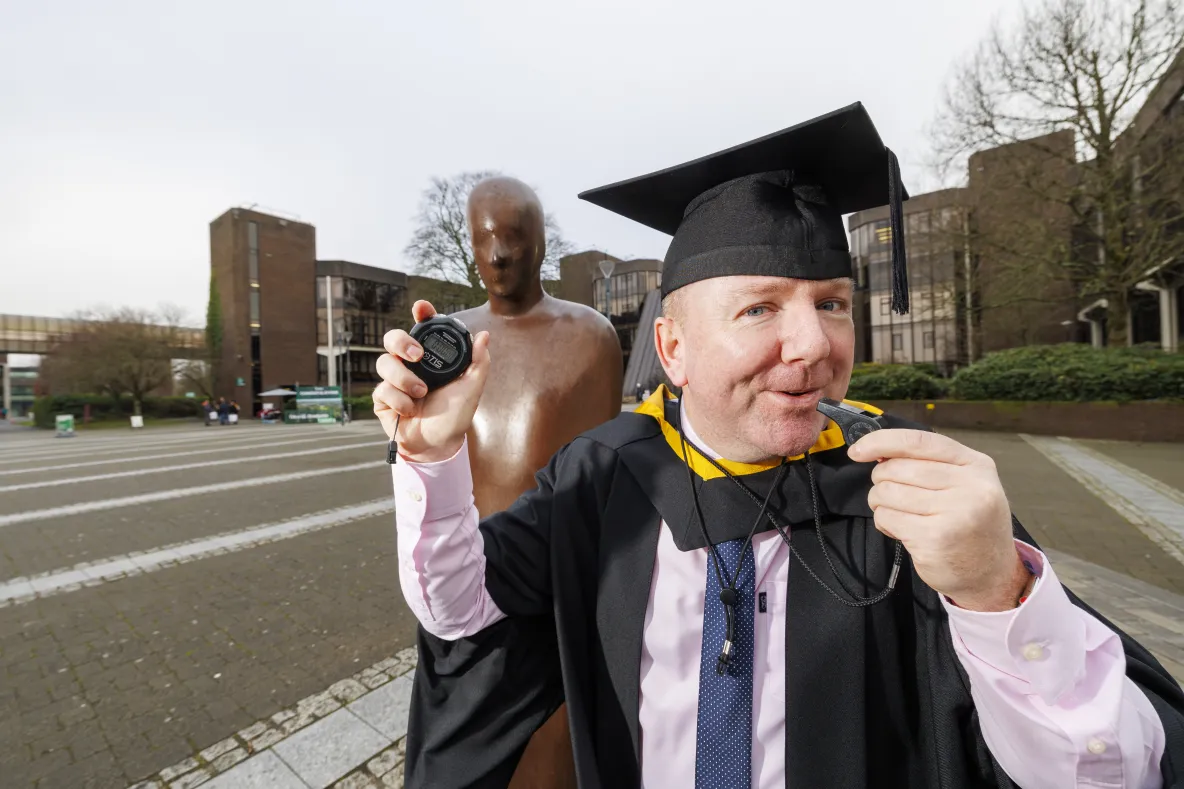

One of Ireland’s leading sports coaches says he has become ‘a better coach’ after graduating from University of Limerick with a first-class honours master’s degree.
Dubliner Stephen Maxwell graduated this week from University of Limerick with an MSc in Applied Sport Coaching.
Having seen widespread burnout among sports coaches, the new UL graduate undertook a research project specialising in self-care for coaches entitled ‘Do Coaches Fill Their Own Cups?’
Stephen joined over 1,700 students being conferred this week as part of the University’s winter ceremonies.
Stephen is Coach Education Manager with Cricket Ireland but is also well known in GAA circles as head coach with the Thomas Davis Men’s Gaelic Senior Football Team in Tallaght. He previously coached the Dublin and Meath Ladies Gaelic Football teams to All-Ireland victory in 2023, 2022 and 2021 respectively.
He wanted to hone his skills further afield and spent two years in Australia working in the professional arena of rugby union, rugby league, Australian Football League and softball.
“Coaching is coaching irrespective of what sport you are in. If you are a good coach, and you know the technical and tactical aspects, as well as the mental and physical – you can coach any sport,” said Stephen.
So why would someone with such vast coaching experience take on a master’s degree in Applied Sports Coaching?
“Working as a professional in the area of coach education, and as a volunteer coach in amateur sport, you’re always trying to get ahead of the trends.”
“I knew myself I could become a better coach from doing this. And because of my role in coach education, I knew there would be a knock-on effect - I have an opportunity to develop so many other coaches who can, in turn, develop players as well.”
UL’s MSc in Applied Sports Coaching is a two-year part-time programme designed to allow experienced coaches to enhance their practice through engagement with leading practitioners and pioneering researchers. There were nine others on the course with Stephen from a wide range of sporting disciplines, including rowing, rugby, basketball, Gaelic football, camogie, soccer and athletics.
“It is daunting going in on day one and embarking on a course like this. But we all bonded instantly because we all wanted to become better coaches and support our athletes. We had one contact day per month in UL where we all got to meet and had the chance to share experiences and approaches. We collaborated on group projects too, so the peer learning was massive.”
As part of the course, Stephen was able to discuss his coaching philosophy and practice with his tutors, receive feedback, reflect on it and look at putting it into practice with his own teams.
When it came to choosing a topic for this master’s thesis, a common issue Stephen observed in his work became his focus.
“I am very passionate about looking after coaches, so my thesis focused on self-care interventions in coaching. Coaches always think about themselves last. They’ll think about their players, they’ll think about their team, and they’ll think about their family but they’re never thinking about themselves.
“It is really important to me to make sure that coaches don’t burn out, whether they’re volunteers or professionals. In any job or career, if you’re not looking after yourself, how can you optimally perform? If you’re not able to look after yourself, you can’t perform to your best,” Stephen explained.
Stephen undertook a 13-week research project where he worked with 10 GAA Academy coaches in Leinster, to get an understanding of how they spent their time and to observe their level of self-awareness.
As part of the project, Stephen held intervention workshops, which he designed to support individuals to become more self-aware and improve their self-care strategies.
“The time management piece was really eye-opening – it didn’t take long for the coaches to realise they were not giving any time to themselves. This was impacting the quality of time they spent with their family. Because they were coaching as volunteers in their spare time, they were doing a full day’s work, rushing home, having a quick dinner but not actively participating in conversation, and then rushing out the door to training,” Stephen explained.
“Even if you think you don’t have too much time, take one week and look at how you spend those 168 hours in the week, break it down and reflect on that – four hours in the car, do I need to do that?”
When you are focusing on spending time on yourself, Stephen’s advice is to ‘spend it on things that energise you’.
“At the end of the 13 weeks, the coaches’ self-awareness had increased dramatically. This led to an increase in productivity and a strengthening of relationships at home and at work. So, there were an awful lot of positives,” Stephen said.
Stephen hopes to publish his research so that his findings can help support coaches across sporting disciplines. He’d also like to pursue a PhD in the area.
Reflecting on his achievements, the new UL graduate added: “Cricket Ireland was very supportive over the last few years in giving me the time to do the master’s. I am very lucky to have a supporting family at home - my partner Lyn, my parents and my brother. I am very privileged that I get to graduate today,” he added.
Telephone: +353-61-213081 or 234392
Faculty Office, Faculty of Education and Health Sciences, University of Limerick, Limerick, Ireland.